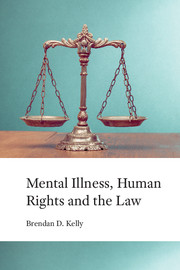Book contents
- Frontmatter
- Contents
- Foreword
- Preface
- Acknowledgements
- List of boxes
- List of legislation, treaties and conventions
- List of cases
- 1 Human rights and mental illness
- 2 Mental Health Acts 1983 and 2007: England and Wales
- 3 Fusing mental health and capacity legislation: Northern Ireland
- 4 Mental Health Act 2001: Ireland
- 5 The challenges of reform: Scotland
- 6 Structural violence, power and mental illness
- 7 Conclusions: fighting for rights
- Notes
- References
- Index
2 - Mental Health Acts 1983 and 2007: England and Wales
Published online by Cambridge University Press: 01 January 2018
- Frontmatter
- Contents
- Foreword
- Preface
- Acknowledgements
- List of boxes
- List of legislation, treaties and conventions
- List of cases
- 1 Human rights and mental illness
- 2 Mental Health Acts 1983 and 2007: England and Wales
- 3 Fusing mental health and capacity legislation: Northern Ireland
- 4 Mental Health Act 2001: Ireland
- 5 The challenges of reform: Scotland
- 6 Structural violence, power and mental illness
- 7 Conclusions: fighting for rights
- Notes
- References
- Index
Summary
Chapter 1 of this book provided a background to key concepts relating to mental illness and human rights, especially the growing application of the principles of human rights to the mentally ill throughout the late 20th century, and the emergence of the UN Principles for the Protection of Persons with Mental Illness and the Improvement of Mental Health Care (United Nations, 1991) and UN Convention on the Rights of Persons with Disabilities (CRPD) (United Nations, 2006).
This chapter moves this examination forward by focusing on mental health legislation in England and Wales. More specifically, this chapter examines the provisions of the Mental Health Act 1983, specific issues stemming from the 1983 Act, and the provisions and human rights implications of the Mental Health Act 2007, which substantially amended, but did not replace, the 1983 Act. The chapter concludes with an overall assessment of current mental health legislation in England and Wales in the context of human rights.
Background to current mental health legislation in England and Wales
Background to the Mental Health Act 1983
There has been some form of statutory control or regulation of individuals with mental illness since at least the 14th century, when the De Praerogativa Regis permitted the Crown to acquire the estates and lands of ‘lunatics’ and ‘idiots’ (Bowen, 2007: p. 10). The first substantial, specific legislative recognition of the need for dedicated in-patient psychiatric care was the Vagrancy Act 1744, which permitted the detention of individuals with mental illness on the order of two Justices of the Peace. The legislative framework underpinning asylum care evolved throughout the 1800s, with lunacy legislation of the early 1890s substantially revising admission criteria (Shorter, 1997: p. 231).
In 1926, the Royal Commission on Lunacy and Mental Disorder signalled a significant shift in emphasis by proposing a voluntary admission status and establishment of out-patient and aftercare services (Royal Commission, 1926). The Mental Treatment Act 1930 duly introduced voluntary admission status, a development that coincided with the introduction of out-patient psychiatric services throughout France, Germany, England and elsewhere (Shorter, 1997: p. 230).
- Type
- Chapter
- Information
- Mental Illness, Human Rights and the Law , pp. 35 - 62Publisher: Royal College of PsychiatristsPrint publication year: 2016



